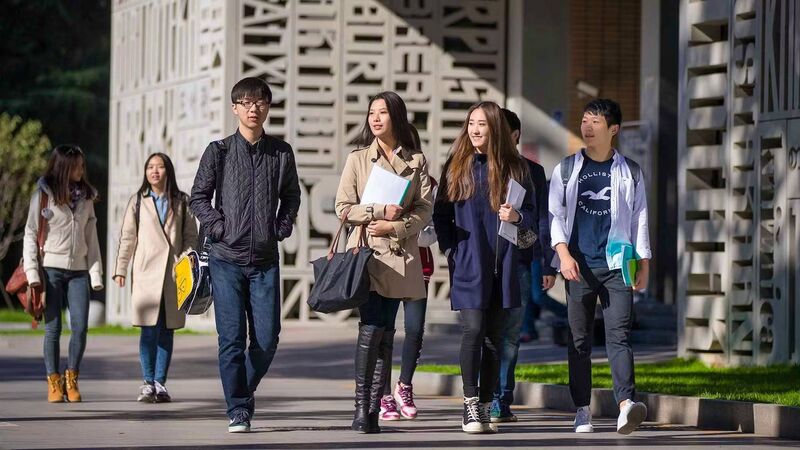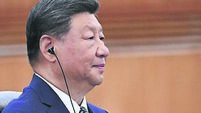How China's first real Irish academy came into being

The Irish Studies Centre at Beijing Foreign Studies University has now enrolled seven groups of MA students and organized a number of cultural and educational activities, which greatly enhanced the Chinese people’s knowledge of Ireland.
Professor Wang Zhanpeng has a very strong memory of the foundation of the Irish Studies Centre at Beijing Foreign Studies University, the first real multidisciplinary and interdisciplinary Irish Centre in China.

Professor Zhanpeng said: “I started my work in Irish Studies in 2006. Your ambassador, Declan Kelleher, knowing that we had programmes for American, British, Australian and Canadian Studies, suggested that we should establish an Irish Studies Centre at BFSU also. That came about in 2007.
“At that time, many academics worked on Irish Literature under the general category of British Literature, and many ordinary Chinese were not aware of the relationship between the South and North of Ireland. The Centre has now enrolled seven groups of MA students and organized a number of cultural and educational activities, which greatly enhanced the Chinese people’s knowledge of Ireland. Today when I talk about the creation of the Centre with our friends, including Ambassador Declan and Professor Jerusha McCormack, everyone has been proud of our decision to do this all those years ago.”
As Zhanpeng’s administrative workload inevitably increased, Professpr Chen Li, who had joined the team in 2014, took over the leadership of the centre. Zhanpeng still finds time to teach two courses for Irish Studies students, one on Irish foreign policy, and the other on new frontiers and academic writing.
“The recent state visit to China of Michael Higgins, President of Ireland, provided an occasion for recalling the richness of cultural relations between China and Ireland. President Higgins made references to Professor Jerusha McCormack’s essay on the vital role of Zhuangzi, an ancient Chinese philosopher, in helping Oscar Wilde formulate his literary thought."
In another speech, to mark Bernard Shaw’s visit in 1933, he spoke highly of the academics who today are active in Irish Studies in China, saying: "Shaw recognized no boundaries in the commitment to international solidarity. I believe that your interest in our culture as well as the revived interest in your great civilization currently manifest in Ireland, offer a robust and fruitful base for the future of Irish and Chinese relations’.
“In fact such encounters between Chinese people and Irish literary giants started as early as the 1920s. Some Chinese intellectuals believed that Irish literature could provide inspiration for the New Culture Movement in China which faced the challenge of how to balance the goals of embracing Western culture while preserving Chinese national identity. Leading writers in the 1920s and 30s in China, such as Lu Xun, Mao Dun, and Guo Moruo translated, and wrote critical essays on Irish writers. As Mao Dun put it, ‘while people were questioning the future and favouring cosmopolitanism, the Irish were paying particular attention to their own history and national traits. The new Irish literature formed a unique school of its own.’
“Chinese interest in Ireland has also been drawn from the shared history of the struggles against foreign domination in the two countries,” he says. “After the People’s Republic of China was founded, some Irish writers such as Jonathan Swift, Oscar Wilde, and Bernard Shaw gained a warmer reception in China for their vehement social criticism and great sympathy towards working people.
“In the second half of the 20th century, most publications in other fields of Irish Studies appeared within the context of British history or politics, involving the great famine, penal laws, the Troubles, etc. Thanks to Karl Marx and Friedrich Engels’ writings on Irish Independence movements, which were seen as part of the international working class’s struggle against the bourgeoisie, Chinese scholars translated into Mandarin the first modern book on Irish history, i.e. Edmund Curtis’ A History of Ireland, in the early 1970s.
“Since China’s opening up to the outside world in the late 1970s, Irish studies have grown fast here. The development of bilateral relations has changed the landscape — in particular since the late 1990s — as Irish studies emerged as a separate discipline in Chinese universities. More than 100 academic papers are published annually in the general studies, theatre, language, and culture under the broad category of Irish literature and Irish-related works by non-Irish writers.
"Two important books have been published on the bilateral relations: one is China and the Irish, and the other Sino-Irish Relations: Cross-cultural Perspectives. The former is a pioneering work on the subject, which recounts the stories of Irish encounters with China since the Qing Dynasty. The latter explores relations between China and Ireland from the broadest multidisciplinary perspectives, yet with some emphasis on the reception of Irish literature in China.”
In this process, stresses Zhanpeng, the Irish Studies Centres and their programmes have played an indispensable role. “Beijing Foreign Studies University (BFSU) has a long tradition of Irish studies. Professor Chen Shu’s An Anthology of Irish Literature (2004) was one of the most representative works in this field.
“The idea of setting up the first full-range Irish studies centre in China emerged in the first years of the 21st century. The joint endeavours from several important forces — the Irish government, NUI Maynooth, UCD, UCC, and TCD, culminated in the official launch of The Irish Studies Centre at BFSU in March 2007, as well as its rapid growth in subsequent years.
“Since its onset, the Centre has been committed to developing a multidisciplinary and interdisciplinary Irish Studies programme. It enrolls MA students biannually in Irish literature, history, and politics, and offers a one-year Irish language course at both postgraduate and undergraduate levels. A number of renowned Irish writers have visited the Centre and participated in seminars: including Paddy Bushe, Desmond Egan, Hugo Hamilton, Sebastian Barry, Colm Tóibín, Dermot Bolger, and Deirdre Madden.
“In March 2014, the Irish studies centres in China jointly set up an Irish Studies Network. Academics from more than 20 Chinese institutions agreed to embark on the project funded by the Irish Department of Foreign Affairs and Trade. It is a result of reflections on the experience of Irish studies in China and of fruitful collaborations between the various Irish studies centres, and colleagues within and outside of China. By setting clear goals for the establishment of such an Irish Studies network, it serves to raise the profile of Irish Studies across the entire higher education sector in China, and so to maximize the potential of Irish Studies in China to contribute to the broader development of Sino-Irish relations.
“As part of the networking efforts, a series of cultural and academic events have been organized by its member centres; for example, an International Symposium on Literature, Culture and Nation Building in 20 th Century Ireland at BFSU in 2014, one on Celtic Literature and Culture in Ireland at Shanghai University of International Economics and Business in June 2014, and an academic Salon at Shanghai Normal University to celebrate the 150th anniversary of W. B. Yeats’s birth on 13 June 2015.
“In the on-going discussions, scholars in Irish studies have formulated a broad consensus on the role of this emerging network. Firstly, it will help establish an interdisciplinary and multidisciplinary curriculum and research agenda in Irish studies in China. Secondly, it will create and strengthen a sense of belonging in the academic community. This is highly relevant for Irish Studies in China where long-standing historical ties based on family or ancestral links tend to be scarce. Thirdly, the establishment of the Network will be a process of transcending various (disciplinary, institutional, and geographical) boundaries. Fourthly, it will contribute to the development of Sino-Irish relations by promoting mutual understanding and facilitating people-to-people dialogues.
“As we enter the second decade of the 21 st century, Irish Studies in China has come to the stage when the question of its disciplinary identity should be addressed. A fundamental question remains in what ways it differs from those in other countries, such as Australia, Brazil, or Canada; or what contribution Chinese scholars could make to the project of Global Ireland. Over the past century, Irish literature has taken the central place in Irish Studies in China. As discussed above, Irish studies in China has developed a distinctive approach by going beyond narrow disciplinary boundaries by examining Ireland’s historical, political, literary, and social complexity. This also results in an increasing interest in exploring the unique Irish contribution to literary criticism, one which locates the literary text within the complex historical context of the island.
“Reception and translation of Irish literary works has been another distinctive feature of building a disciplinary identity in Irish Studies here. In the 21st century, the publications of Ireland’s world writers such as James Joyce, W. B. Yeats, and Samuel Beckett are increasing rapidly in China while more and more scholarly attention has been directed to some contemporary writers such as Colm Toibin, Brian Friel, and Marina Carr. Hailed as ‘the most remarkable fact of translation” in the 20 th century, Xiao Qian and Wen Jieruo’s translation of Ulysses as well as another Chinese edition by Jin Di has been widely examined by Chinese researchers in terms of the texts, translation techniques, and readers’ responses. The recent publication of the Chinese translation by Dai Congrong of Finnegans Wake has drawn new academic attention in advancing cross-cultural understanding through experimental literary translation.
“Moreover, interdisciplinary or multidisciplinary dialogues have emerged as the newest trends within Irish studies as conducted in China. More authoritative works on the history of Ireland have been translated, e.g. Robert Kee’s Ireland: A History, and Dermot Keogh’s Twentieth Century Ireland. Through the study of the Sino-Irish relations, scholars in China have been faced with questions of Irish identity, one complicated by the Irish people’s unique historical and cultural experiences. This is exemplified by the study of Sir Robert Hart.
“Prior to the early 21 st century, Robert Hart was seen as a citizen of the British Empire. A few recent publications in China argue that the fact that Hart was born in Ulster and graduated from Queens’ University Belfast, resulted in his strong awareness of cultural difference and recognized competence in inter-cultural communication. These traits were crucial in his success in China. They go even further to find that Hart once argued that Western powers should treat Chinese people as equals, and that one day in the future an armed China would stand among the great powers of the world.
“Seconding Hart’s high opinion of China’s future in 1957, the Irish Foreign Minister Frank Aiken decided temporarily to change Ireland’s vote in order to consider the possibility of recognizing People’s Republic of China in the UN debates on the representation of China. Ultimately support from Ireland helped bring about the PRC’s membership in the UN in 1971. It is such studies by Chinese scholars that have tended to confirm the way that cultural affinities and cognate historical experiences have shaped the relationship of Ireland and China as newly emergent nations.
“In the recent debates on the making and reforming of Irish identity, this dialogue continues, and was indeed intensified during the centenary of the 1916 Easter Rising. Surprise has been expressed at the rapid pace of transformation of Ireland from de Valera’s conservative, rural, Catholic island into a modern or even postmodern European nation — particularly so when Irish voters chose to legalize same-sex marriage by referendum in May 2015. As Professor McCormack observed, the experiences of Ireland, which has entered that modern world only in recent generations, ‘may be seen as providing maps’ for Chinese people’s own path to modernity. In this sense, Irish Studies in China can complement the ongoing discourse prompted by the transformation or redefinition of Irish national identity in this era of globalization."







